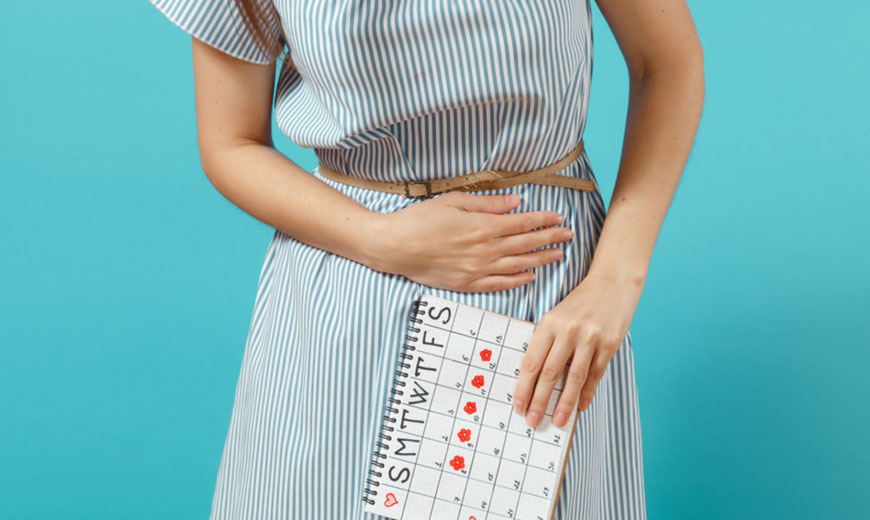Premenstrual syndrome (PMS) is a recurrent condition in women characterized by uncomfortable symptoms seven to fourteen days before menstruation. Typical symptoms include decreased energy level, tension, irritability, depression, headaches, change in sex drive, chest pain, back pain, bloating, and swelling of the fingers and ankles.
For many years, it was thought that increased estrogen levels and decreased progesterone levels before menstruation were responsible for PMS. However, this approach is no longer as popular. Today, it is believed that PMS is not due to changes in hormone levels, but rather to changes in brain chemistry that influence a variety of factors, including the brain’s sensitivity to hormones. The main focus that has been put forward as the primary cause of PMS is related to lower levels of the neurotransmitter serotonin. Recent research suggests that many natural antidepressants may have a positive effect in PMS.
Natural relief of premenstrual syndrome with diet and supplements
Reduce or eliminate animal products from your diet and increase consumption of fiber-rich plant foods. Eat fruits, vegetables, grains and legumes. Vegetarians have been shown to excrete two to three times more estrogen in their stool and have 50% lower levels of free estrogen in their blood than people who consume both plant foods and meat.. These differences are thought to result from the lower fat intake and higher fiber intake of vegetarians.
Reduce or eliminate caffeine intake
Caffeine consumption is closely related to the presence and severity of symptoms in premenstrual syndrome. Caffeine should therefore also be avoided by women with PMS. The effect of caffeine is particularly significant in psychological symptoms associated with PMS such as anxiety, irritability, insomnia and depression. Caffeine also has an adverse effect on the way estrogen stimulates breast tissue, which can contribute to breast tenderness and fibrocystic breast disease.
Eat more soy
There is evidence that phytoestrogens have a balancing effect on PMS when estrogen levels are high. Eating soy foods is the most economical and probably the most beneficial way to increase phytoestrogen intake. Vitamin B6 also has an effect on estrogen metabolism. Vitamin B6 is found in wild yams, leafy green vegetables, and legumes.
Reduce salt
Excessive salt consumption (sodium chloride), combined with reduced dietary potassium intake, severely strains the kidneys’ ability to maintain fluid exchange in the body. As a result, some people are ‘salt sensitive’ as high salt intake causes high blood pressure or water retention. It is generally a good idea to avoid salt if you have PMS. If you are prone to water retention during the latter part of your menstrual cycle, reducing your salt intake is an absolute must.
Supplement your diet with key nutrients
As stated above, vitamin B6 is crucial for maintaining hormonal balance. Vitamin B6 supplementation has been shown to have a positive effect on all PMS symptoms (especially depression) in many women. Since 1975, there have been at least a dozen double-blind clinical trials confirming the beneficial effects of this vitamin. In most cases, a therapeutic dose of 50 to 100 mg per day is generally considered safe, even with prolonged use.
Which other nutrients have beneficial effects in PMS:
- Magnesium deficiency is associated with symptoms of premenstrual syndrome. There is evidence that magnesium levels in the red blood cells of patients with PMS are significantly lower than those of patients who do not suffer from this syndrome. Because of its important role in normal cell function, magnesium deficiency can contribute to a variety of symptoms associated with PMS. Several studies have shown that when multivitamins and mineral supplements containing high doses of magnesium and vitamin B6 are taken, patients with PMS experience a significant improvement in symptoms. The recommended intake of magnesium is between 300 and 450 mg daily.
- Calcium supplementation has been shown to result in significant improvement in PMS symptoms. Calcium improves the altered hormonal patterns, neurotransmitter levels, and smooth muscle response seen in PMS. The importance of calcium is great as women with PMS have decreased bone mineral density. The recommended dose of calcium is between 1000 and 1500 mg daily.
- Zinc levels are also important in PMS. It is distinguished as a key element in maintaining the balance of hormones in the body, and this balance is essential in preventing PMS symptoms. Adding zinc to the diet can be beneficial, especially for those struggling with hormone imbalances prior to menstruation. The recommended intake of zinc is between 15 to 20 mg.
- Iron plays an important role in the body, including during the monthly cycle. During this period, women often lose more iron due to bleeding, which can lead to anemia, a condition in which the body does not produce enough red blood cells. Fruit Vitamins with Iron – Frank Fruities Pump Iron have a pleasant taste of blackcurrant and apple and provide optimal doses of iron to the body.
- Vitex (Chaste tree) extract has been used for centuries in folk medicine to relieve symptoms of premenstrual syndrome (PMS). Vitex influences hormonal balance, especially by regulating pituitary activity and balancing the ratio between progesterone and estrogen in the female body.
- Ginkgo biloba extract is widely known for its beneficial effects on blood flow to the brain. It has been scientifically proven to provide significant benefits in premenstrual syndrome (PMS) as well. The extract not only improves the psychological aspects of PMS, but also effectively reduces some of the physical symptoms. Ginkgo Biloba extract is particularly effective in reducing pain and breast tenderness in PMS.
How do serotonin levels affect premenstrual syndrome?
You may be asking yourself, “If one of the main characteristics of PMS for most women is decreased serotonin levels, can we increase its levels?” Although more and more doctors are prescribing selective serotonin reuptake inhibitors, or antidepressants, their use is not recommended. There are also natural compounds providing similar benefits with fewer side effects.
Natural antidepressants
In conjunction with the drive to reduce the side effects and risks associated with taking standard antidepressants, natural antidepressants represent a promising alternative.
St. John’s wort extract and its effectiveness:
One of the commonly used natural antidepressants is St. John’s wort extract. This herbal preparation is typically taken in doses of 900 to 1800 mg daily and has been linked to proven effectiveness in managing symptoms of premenstrual syndrome (PMS). St. John’s wort acts as a gentle stimulant of the serotonin system and may aid in mood regulation. At the same time, the extract minimizes the side effects often found with the use of conventional antidepressants.
The role of 5-HTP and its benefits:
The compound 5-HTP (5-hydroxytryptophan) is another key player in the field of natural antidepressants. Dietary supplements that contain 5-HTP provide better results, especially in patients whose PMS symptomatology is associated with sugar cravings. This chemical compound serves as a precursor to serotonin and helps balance this neurotransmitter in the body. Supplementation with 5-HTP can be an effective method of maintaining stable serotonin levels and managing the emotional symptoms of PMS.
In conclusion
Every month, numerous women experience premenstrual syndrome (PMS), which can be physically and emotionally debilitating. Fortunately, there are a variety of methods and approaches that can significantly alleviate symptoms and improve quality of life during this period.

